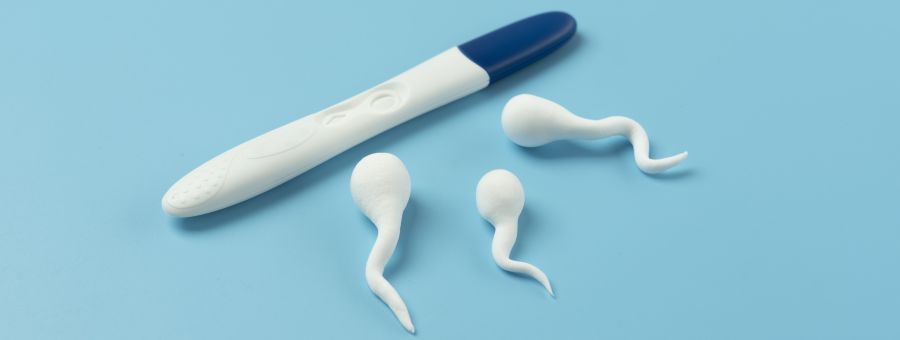Your weight can significantly impact your fertility journey, but understanding this connection empowers you to make informed decisions about your reproductive health. At Avida Fertility, we help you navigate these challenges with personalized care and evidence-based treatments.
Understanding the Weight-Fertility Connection
When you're trying to conceive, your body weight plays a more significant role than you might realize. Both being underweight and overweight can affect your hormonal balance, ovulation patterns, and overall reproductive health. This connection exists because your body fat produces hormones that directly influence your menstrual cycle and fertility.
Your Body Mass Index (BMI) serves as a useful indicator of how your weight might be affecting your fertility. However, it's important to remember that BMI is just one piece of the puzzle. Your overall health, lifestyle factors, and individual circumstances all contribute to your fertility potential.
| BMI Category | BMI Range | Potential Fertility Impact |
|---|---|---|
| Underweight | Below 18.5 | Irregular ovulation, amenorrhea |
| Normal Weight | 18.5-24.9 | Optimal fertility conditions |
| Overweight | 25-29.9 | Mild hormonal disruptions |
| Obese | 30 and above | Significant fertility challenges |
Research shows that women with a BMI outside the normal range may experience longer time to conception and may require additional support during fertility treatments. However, this doesn't mean pregnancy is impossible – it simply means you might benefit from targeted interventions and support.
How Excess Weight Affects Female Fertility
When you carry excess weight, your body produces higher levels of insulin and certain hormones that can disrupt your reproductive system. This hormonal imbalance can lead to several fertility challenges that directly impact your ability to conceive naturally.
Excess weight often leads to insulin resistance, which causes your body to produce more insulin. This elevated insulin level can increase androgen production, leading to conditions like Polycystic Ovary Syndrome (PCOS). PCOS affects up to 10% of women of reproductive age and is one of the leading causes of female infertility.
| Weight-Related Fertility Issue | How It Affects Conception | Treatment Approach |
|---|---|---|
| Irregular Ovulation | Unpredictable egg release | Ovulation induction medications |
| PCOS | Multiple cysts, hormonal imbalance | Metformin, lifestyle changes, ovulation medications |
| Poor Egg Quality | Reduced fertilization potential | Antioxidant supplements, weight management |
| Endometrial Issues | Poor implantation environment | Hormonal support, weight optimization |
Your endometrium, the lining of your uterus where embryos implant, can also be affected by excess weight. Higher estrogen levels associated with increased body fat can lead to endometrial hyperplasia or other conditions that make implantation more difficult.
The Impact of Being Underweight on Fertility
While much attention focuses on excess weight, being underweight can be equally challenging for your fertility. When your body doesn't have adequate fat stores, it may shut down non-essential functions, including reproduction, to preserve energy for vital organs.
If you're underweight, you might experience irregular periods or complete absence of menstruation (amenorrhea). This happens because your body needs a certain amount of body fat to produce adequate levels of reproductive hormones like estrogen and progesterone.
According to Chavarro et al. (2007), women with a BMI below 20 had a 43% higher risk of ovulatory infertility compared to women with a BMI between 20-24. This research, published in the American Journal of Clinical Nutrition, highlights the importance of maintaining adequate body weight for optimal fertility.
| Underweight Fertility Challenge | Mechanism | Solution |
|---|---|---|
| Amenorrhea | Insufficient hormone production | Gradual weight gain, nutritional support |
| Irregular Cycles | Disrupted hypothalamic function | Hormone therapy, lifestyle modifications |
| Poor Egg Development | Inadequate nutritional reserves | Targeted nutrition, weight restoration |
| Implantation Issues | Thin endometrial lining | Estrogen support, adequate caloric intake |
Weight's Effect on Male Fertility
Your partner's weight also plays a crucial role in your fertility journey. Men who are significantly overweight or underweight may experience reduced sperm quality, lower testosterone levels, and decreased fertility potential.
Excess weight in men can lead to increased scrotal temperature, which negatively affects sperm production. Additionally, obesity is associated with hormonal imbalances that can reduce testosterone levels and increase estrogen production, further impacting sperm quality and sexual function.
Research by Sermondade et al. (2013) in Human Reproduction Update found that overweight and obese men had significantly lower sperm concentration and total sperm count compared to men with normal BMI. The study also showed that these men had higher rates of DNA fragmentation in their sperm.
| Male Weight Issue | Fertility Impact | Improvement Strategy |
|---|---|---|
| Obesity | Reduced sperm count and motility | Weight loss, exercise programs |
| Underweight | Lower testosterone levels | Nutritional support, strength training |
| Metabolic Syndrome | Hormonal disruptions | Comprehensive lifestyle changes |
| Heat Exposure | Impaired sperm production | Weight reduction, cooling strategies |
Weight Management and IVF Success Rates
When you're considering IVF treatment, your weight can significantly influence your success rates. Many fertility clinics, including Avida Fertility, may recommend weight optimization before beginning treatment to maximize your chances of success.
Women with a BMI over 35 may experience reduced IVF success rates due to several factors. These include poor response to ovarian stimulation medications, increased risk of pregnancy complications, and higher rates of miscarriage. However, with proper preparation and support, successful pregnancies are still very achievable.
The good news is that even modest weight loss can significantly improve your fertility outcomes. Studies show that losing just 5-10% of your body weight can restore regular ovulation in many women with PCOS and improve overall fertility potential.
| BMI Range | IVF Live Birth Rate | Recommended Action |
|---|---|---|
| 18.5-24.9 | Optimal rates | Maintain current weight |
| 25-29.9 | Slightly reduced | Consider modest weight loss |
| 30-34.9 | Moderately reduced | Weight loss recommended |
| 35+ | Significantly reduced | Weight optimization essential |
Practical Weight Management Strategies for Fertility
Taking control of your weight doesn't mean embarking on extreme diets or punishing exercise regimens. Instead, focus on sustainable, healthy changes that support both your overall health and your fertility goals. Small, consistent changes often yield the best long-term results.
Start by working with healthcare professionals who understand the unique nutritional needs of people trying to conceive. A registered dietitian specializing in fertility can help you create a balanced eating plan that supports healthy weight management while providing essential nutrients for reproduction.
| Strategy | Implementation | Fertility Benefit |
|---|---|---|
| Balanced Nutrition | Fertility-supporting foods, portion control | Hormonal balance, egg quality |
| Regular Exercise | Moderate activity, strength training | Improved insulin sensitivity |
| Stress Management | Meditation, counseling, stress reduction | Hormonal regulation |
| Sleep Optimization | Quality sleep habits | Hormone production, recovery |
Remember that rapid weight loss can actually harm your fertility by disrupting your hormonal balance and menstrual cycle. Aim for gradual, sustainable weight loss of 1-2 pounds per week if you need to lose weight, or gradual weight gain if you're underweight.
When to Seek Professional Help
You don't have to navigate weight and fertility challenges alone. If you've been trying to conceive for six months to a year without success, or if you have irregular periods related to weight issues, it's time to consult with fertility specialists.
At Avida Fertility, we understand that weight-related fertility challenges require a comprehensive, compassionate approach. Our team includes reproductive endocrinologists, nutritionists, and counselors who work together to address all aspects of your fertility journey.
Consider seeking professional help if you experience irregular periods for more than three months, have been trying to conceive for over a year (or six months if you're over 35), or have been diagnosed with conditions like PCOS or metabolic syndrome that affect both weight and fertility.
| Situation | Recommended Timeline | Next Steps |
|---|---|---|
| Irregular cycles + weight issues | After 3 months | Comprehensive fertility evaluation |
| Trying to conceive over 35 | After 6 months | Fertility consultation, testing |
| PCOS diagnosis | Immediately | Specialized treatment plan |
| Significant weight changes | Before trying to conceive | Pre-conception counseling |
Nutritional Support for Fertility and Weight Management
Your nutritional choices play a dual role in supporting both healthy weight management and optimal fertility. Focus on nutrient-dense foods that provide the vitamins and minerals essential for reproductive health while helping you achieve and maintain a healthy weight.
Key nutrients for fertility include folic acid, which supports early fetal development, and vitamin D, which plays a role in hormone regulation and egg quality. Iron, omega-3 fatty acids, and antioxidants also support reproductive health while contributing to overall wellness.
| Nutrient | Fertility Role | Food Sources |
|---|---|---|
| Folic Acid | DNA synthesis, neural tube development | Leafy greens, legumes, fortified grains |
| Vitamin D | Hormone regulation, egg quality | Fatty fish, fortified dairy, sunlight |
| Omega-3s | Inflammation reduction, hormone balance | Salmon, walnuts, flaxseeds |
| Antioxidants | Protect eggs and sperm from damage | Berries, colorful vegetables, nuts |
Consider working with a nutritionist who specializes in fertility to develop a personalized eating plan. They can help you identify any nutritional gaps in your diet and recommend appropriate supplements to support both your weight goals and fertility potential.
The Role of Exercise in Fertility and Weight Management
Regular physical activity supports both healthy weight management and fertility, but finding the right balance is crucial. Moderate exercise can improve insulin sensitivity, reduce stress, and support healthy hormone levels, all of which benefit your fertility.
However, excessive exercise can actually harm your fertility by disrupting your menstrual cycle and reducing reproductive hormone levels. The key is finding an exercise routine that supports your overall health without placing excessive stress on your body.
| Exercise Type | Fertility Benefits | Recommended Frequency |
|---|---|---|
| Moderate Cardio | Improved circulation, weight management | 150 minutes per week |
| Strength Training | Muscle maintenance, metabolic health | 2-3 sessions per week |
| Yoga/Stretching | Stress reduction, flexibility | Daily or as desired |
| Walking | Low-impact movement, stress relief | Daily, 30-60 minutes |
Frequently Asked Questions
How much weight loss is needed to improve fertility?
Even modest weight loss of 5-10% of your body weight can significantly improve fertility outcomes. For a 200-pound woman, this means losing just 10-20 pounds could restore regular ovulation and improve conception chances.
Can I get pregnant if I'm overweight?
Yes, many women who are overweight conceive naturally and have healthy pregnancies. However, excess weight may increase the time it takes to conceive and could affect fertility treatment success rates. Working with your healthcare team to optimize your health can improve your chances.
Will fertility medications work if I'm overweight?
Fertility medications can still be effective if you're overweight, though you may need higher doses or different protocols. Your fertility specialist will adjust your treatment plan based on your individual needs and response to medications.
How long should I try to lose weight before starting fertility treatment?
This depends on your individual situation, age, and how long you've been trying to conceive. Generally, 3-6 months of focused weight management can yield significant improvements, but your fertility specialist can help you determine the best timeline for your specific circumstances.
Can being underweight affect my partner's fertility too?
Yes, being significantly underweight can affect male fertility by reducing testosterone levels and sperm production. Both partners should aim for a healthy weight range to optimize fertility potential.
Moving Forward with Confidence
Understanding the connection between weight and fertility empowers you to make informed decisions about your reproductive health. Remember that your weight is just one factor in your fertility journey, and there are many effective treatments and strategies available to help you achieve your family-building goals.
At Avida Fertility, we believe that every person deserves compassionate, comprehensive care that addresses all aspects of their fertility journey. Whether you need support with weight management, choosing the right treatment, or navigating the emotional aspects of fertility challenges, our team is here to guide you every step of the way.
Your fertility journey is unique, and your treatment plan should be too. By working with experienced fertility specialists who understand the complex relationship between weight and reproductive health, you can develop a personalized approach that maximizes your chances of success while supporting your overall well-being.
Considering IVF treatment? Avida Fertility is here to support and guide you on your fertility journey. Reach out today for a personalized consultation and take the first step towards building your family with confidence.






.png)







.svg)
.svg)
